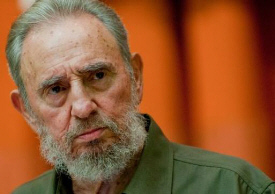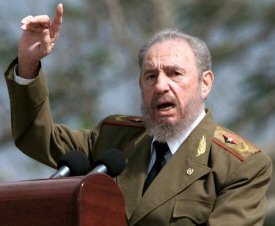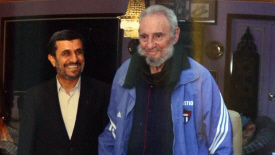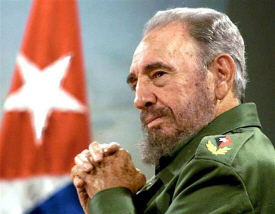"It would be the worst mistake in US history if it attacks Iran, former Cuban leader Fidel Castro said Thursday.
 It would be the worst mistake in US history if it attacks Iran, former Cuban leader Fidel Castro said Thursday, the official daily Granma reported.
It would be the worst mistake in US history if it attacks Iran, former Cuban leader Fidel Castro said Thursday, the official daily Granma reported.
In an article titled "The Roads Leading to Disaster," – published by Granma - the retired elder statesman said there was "no doubt the United States is about to commit the worst mistake in its history" if it decides to attack Iran in coordination with the Zionist entity.
Washington is "wrong" to think that "men and women in Iran's Armed Forces...known for their religious principles and traditions of struggle, will surrender without firing a shot," Castro wrote.
Castro also defended Iran's right to develop nuclear power for peaceful purposes.
 "Iran does not have nuclear weapons," he said, adding that while the Middle Eastern country is accused of producing enriched uranium, it is as a source of energy or for medical uses.
"Iran does not have nuclear weapons," he said, adding that while the Middle Eastern country is accused of producing enriched uranium, it is as a source of energy or for medical uses.
"Like it or not, its possession is not the equivalent of producing nuclear weapons," Castro said.
On the other hand, he noted that “Israel has hundreds of these weapons today, which with the help and cooperation of the United States manufactured nuclear weapons without informing or making itself accountable to anyone.”
Castro pointed out that the Zionist government has openly expressed its intention to attack the Iranian facilities of enriched uranium, while the US government has invested hundreds of millions dollars to manufacture a bomb for that purpose."
Castro cited a press report that a new 13.6-tonne conventional bomb was being developed by the United States that would be able to blast through protective bunkers.
 “A top U.S. Air Force general has described the biggest conventional warhead – the 30,000-pound bunkerbuster bomb – as ‘great’ for a military strike on Iran,” Castro reported Michel Chossudovsky and Finian Cunningham as writing in their article.
“A top U.S. Air Force general has described the biggest conventional warhead – the 30,000-pound bunkerbuster bomb – as ‘great’ for a military strike on Iran,” Castro reported Michel Chossudovsky and Finian Cunningham as writing in their article.
"Imagine US forces dropping monstrous bombs able to penetrate 60-meter-thick walls on industrial facilities," he wrote.
Castro, 85, handed power over in Cuba to his younger brother Raul in 2006, after he underwent surgery for an intestinal ailment. Since then, he has been writing editorials on major world events, including climate change and the possibility of a devastating nuclear war.
He has also published his memoirs of the guerrilla war he headed which toppled Cuban dictator Fulgencio Batista, as well as other autobiographical works.
